Rob Nunn's Blog: Interesting Though Elementary, page 6
September 3, 2023
This Great International Affair [REIG]
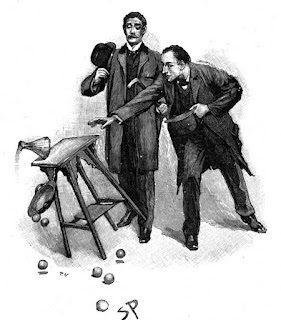
I needed a topic to talk about for a scion meeting this month, so I thought a quick rundown of the history of the title change in "The Reigate Squires" would be an easy one. Maybe define the word for other boorish Americans and quote some folks. Easy peasy. But just to make sure I wasn't missing anything that was common knowledge with apocryphal story of the name change, I told my wife I needed just a few minutes with my books to check some things.
Over the years, there has been plenty of confusion with the title of the seventh case in The Memoirs of Sherlock Holmes. Is it "The Reigate Squires" or should "Squires" be singular? And haven't I seen it listed as "The Reigate Puzzle"? Turns out, it's an international dispute.
According to D. Martin Dakin's entry for this story in A Sherlock Holmes Commentary:
"This first appeared in The Strand as The Reigate Squire (singular); but evidently soon after, this name struck Watson as inappropriate for the two men concerned, and in The Memoirs it was changed to The Reigate Squires. In the American editions it has usually been altered to The Reigate Puzzle: it is believed that the first American editors feared that the word 'Squires' would be offensive or even incomprehensible to the Sons of the Free."
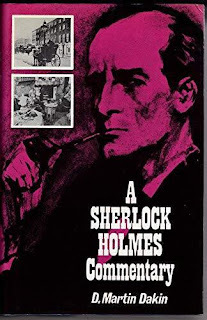
Thinking on Dakin's quote, I have to admit that it felt off because in GREE, Holmes famously told Watson that “My ancestors were country squires, who appear to have led much the same life as is natural to their class." Why can Americans be expected to understand it in this context but not in a story's title?
But Dakin's theory has been the explanation given for as long as I can remember. And like many other things in Sherlockiana, I've trusted those that have come before me as they are always smarter than me and usually correct.
And only one page of the manuscript exists, and that isn't the title page. So we can't go to the source material for this one. So I delved a little deeper into this, and came across an article from Baker Street Miscellanea, Number 35, Autumn 1983. Ann Byerly reports that in Sidney Paget's account book from March 1893 says "7 drawings S.H. (Reigate Puzzle)".
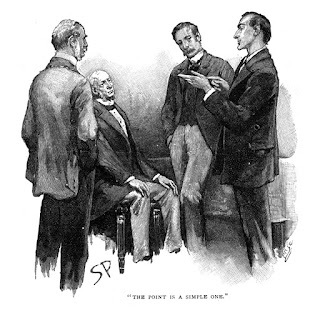
It seemed odd that Paget would use "Puzzle," but that could be brushed away as Paget is connected with so many Sherlock Holmes stories. Surely his contact at the American magazine, Harper's Weekly, reported this title to him at some point.
But Paget didn't illustrate the American edition.
As with so many Sherlock Holmes stories published in The Strand magazine, Sydney Paget illustrated the tale. But Harper's Weekly in America commissioned W. H. Hyde for two illustrations. There is no connection between the British illustrator and the American title.
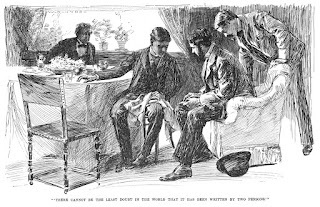
So why would Sydney Paget refer to this story as "The Reigate Puzzle"?
Byer posited in her article that Doyle originally titled the story "Puzzle" but after sending his submission to America, changed his mind and changed the manuscript title to "Squire." Four years after this article was published, Richard Lancelyn Green stated the same theory in his essay on the story in The Baker Street Dozen. Lancelyn Green hypothesized that Doyle wrote to The Strand editor and requested the title be changed. (Constantine Rossakis later told me in an email that Green changed his mind, but I've yet to see documentation on that point.)
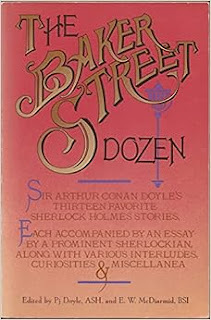
(Lancelyn Green also pointed out that there can only be one squire, as The Oxford English Dictionary defines the word "squire" as meaning "one who is the chief land-owner, magistrate, or lawyer in a district." So the plural edition that we've all been using is incorrect. Confused yet? Me too.)
At the time of this writing, I have spent two hours in this rabbit hole and have dug through: A Sherlock Holmes Commentary, Baker Street Miscellanea, The Baker Street Dozen, From Holmes to Sherlock, The Oxford Annotated edition of The Memoirs, The Sherlock Holmes Reference Library edition of The Memoirs, The Baker Street Journal, The Green Bag Almanac, a few emails, and numerous websites. So much for "just a few minutes with my books."
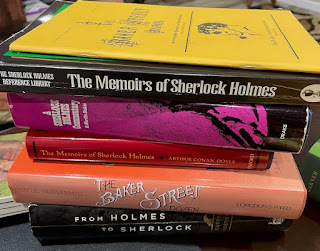
After all of this, you know what I've come up with?
The American title is the right one and the British version is incorrect. USA! USA! USA!
August 27, 2023
Interesting Interview: Rich Krisciunas
If you've been anywhere around Sherlockiana over the past few years, you've seen the name Rich Krisciunas. He started popping up in a bunch of Zoom meetings during Covid and seemed like a nice guy. Turns out, that's not an act. Rich has been to plenty of Sherlockian gatherings once the world opened back up and everyone who's met him, myself included, agree that he is a joy to spend time with.
And Rich's work pops up all over the place! He's active in his local scion, is resurrecting another, and was just published in a recent issue of The Baker Street Journal. He runs the John H. Watson Society's annual treasure hunt. He gives a monthly presentation on law at the Crew of the Barque Lone Star Zoom meetings. He is one of the founding members of The Legion of Zoom. He presented at Holmes in the Heartland. And if a scion society is hosting a meeting online, you can count on him being there and contributing to the discussion. Did I forget something? Probably. There's no keeping up with this guy. But you can get to know him a little better in this week's interview!

How do you define the word “Sherlockian”?
I’m a simple guy. I look at a “Sherlockian” as anyone who enjoys any facet of Sherlock Holmes from the Canon, pastiches, movies, to any TV series and who is part of our community.
How did you become a Sherlockian?
I was introduced to Sherlock Holmes in the early 60’s when a local TV station showed the Basil Rathbone and Nigel Bruce movies. I loved his deductions. I don’t recall reading the stories because I mostly read stuff about baseball.
In the 1970’s, my wife bought me the Annotated Sherlock Holmes for Christmas and she gave me a different Sherlock Holmes book every year that I read during the Christmas break. One year it was Nicholas Meyer’s The Seven-Percent-Solution, another year Loren D. Estleman’s Sherlock Holmes versus Dracula or The Adventures of the Sanguinary Count.
I had a framed Hound of the Baskervilles movie poster that I hung in my office and another lawyer saw it and invited me to a meeting of The Amateur Mendicant Society of Detroit. I attended several meetings and enjoyed the camaraderie playing The Game but had to drop out after I was promoted to a special unit where I tried only First Degree Murder cases and didn’t have time for recreational reading.
After I retired from the active practice of law, I discovered that the Mendicants were still meeting and there were three other societies in Michigan. I began attending their meetings and rekindled my love for the Canon. I hate to admit it but because of the Covid pandemic, I was able to attend numerous virtual meetings each week and made Sherlockian friends I never would have met.
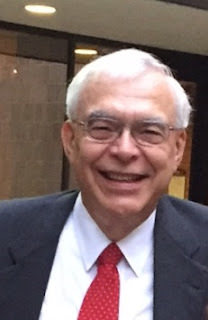
What is your profession and does that affect how you enjoy being a Sherlockian?
I am a lawyer and have been involved in criminal law for 48 years. I joined the Wayne County Prosecutor’s Office in Detroit after graduation in 1975. After retiring as the Chief of the Trial Division in 2004, I was hired, full-time, by my alma mater, the University of Detroit, where I have taught Trial Practice as an adjunct professor since 1983. I began defending court-appointed clients so I could take my students to court with me. I did that for 12 years and handled a couple thousand cases. Currently, I work as a city attorney at a local district court, six minutes from my house, one morning a week.
I’ve found a niche doing Sherlockian Law 101 for the Crew of the Barque Lone Star every month. When I read the canon, I always think about how I would prosecute or defend the people Holmes suspected of crimes. Which witnesses could testify? What evidence would be admissible? What would I argue to a jury? I have enjoyed writing articles and making presentations about prosecuting Sherlock Holmes and defending people like Beppo, Adelbert Gruner and Captain James Clayton.
What is your favorite canonical story?
Charles Augustus Milverton. “The worst man in London.” Blackmail. Holmes disguised as a plumber. Engaged! Poor Agatha. Holmes deciding to commit a burglary. Loyal Watson refusing to let Holmes do it alone. Milverton isn’t asleep and both are trapped. The surprise shooting of Milverton. Holmes’ refusal to help Lestrade. “My sympathies are with the criminals.” Holmes playing with Lestrade, “My, it might be a description of Watson.” The most fun for me was writing a paper proving that a “regal and stately lady” didn’t kill Milverton but the real shooter was, actually, Sherlock Holmes.
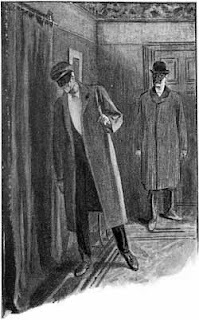
Who is a specific Sherlockian that you think others would find interesting?
I can’t limit it to one. Without a doubt, it’s Bob Katz, Paul Thomas Miller and Mike McSwiggin. They all influenced and inspired me and made me laugh whenever they did a presentation. They all came up with clever and unique perspectives that no one had thought of before.
For years, I read writings about the writings that were serious and then I heard their presentations. They were thoroughly researched, plausible and funny, and it hit me to think about what hasn’t been done before. Katz’s paper on Dr. Watson being at Gettysburg when he was a youth inspired me to look at everything in the Canon differently. Miller’s blog, The Shingle of Southsea is brilliant. They inspired me to write things like the disgusting and despicable Baren Adelbert Gruner was, simply, “The Most Misunderstood Man in the Canon.”
What subset of Sherlockiana really interests you?
I love the legal aspects in the stories. I like to read the writings about the writings and I love the BSI Professional Series like Canon Law and Nerve and Knowledge. Whenever I read a canonical story, I enjoy going down rabbit holes after finding something that intrigues me or I don’t understand. I love finding the back stories in every adventure. Thank goodness for the Internet. For instance, when I read about doctors Palmer and Pritchard, the “first of criminals,” in "Speckled Band," I researched who they were and who they poisoned so I could do a presentation at my local scions or on Zoom for other groups.

Your monthly presentations on Sherlockian Law 101 are always fun and informative. How do you juggle the differences in British vs. American law?
Thank you and thanks to Steve Mason and the Crew of the Barque Lone Star for inviting me to present. American law is based largely on the Common Law of England so there are not a lot of differences. Thanks to the Internet and the University of Detroit Mercy School of Law library, I have access to law books and legal search engines that enable me to read old law review articles, statutes and court cases from the nineteenth century.
I’ve enjoyed doing legal research since I attended law school in the 70’s so it’s all fun and not work at all. Being retired, if I’m not golfing or watching hockey, I’m doing legal research for Sherlockian Law 101 or some future Sherlockian presentation on Zoom or for my local scions, like the Ribston-Pippins.
How do you go about preparing the John H. Watson Society's treasure hunt? That seems like a HUGE undertaking!
OMG How did I ever think volunteering to do the treasure hunt was a good idea? It’s like running a marathon. I start at the beginning of each new year. I try to come up with a topic and do the research for that set of questions. I complete one set every month. One funny thing is that no matter how thorough I think my preparation has been, I am always surprised when someone comes up with an answer I didn’t anticipate and I have to give credit for the answer.
What book would you recommend to other Sherlockians?
I really like two volume set The Grand Game for the historical perspective on the stories and Mattias Bostrom’s “From Holmes to Sherlock” so you can see what was going on in Conan Doyle’s life during the time he was writing certain stories.

Where do you see Sherlockiana in 5 or 10 years from now?
I hope I’m still around to see it. We need to figure out a way to attract more people, especially younger readers, to attend society meetings in person or virtually on Zoom, and to subscribe to publications like The Baker Street Journal, Sherlock Holmes Review, Canadian Holmes and Sherlock’s Spotlight.
I’m worried about the future as most of us are getting older. There’s a scion in Michigan that’s been around since 1946 that stopped meeting in person after the pandemic began. I contacted its 45 members and am trying to resuscitate the group but only a dozen have agreed to attend a future meeting. I see a lot of the same faces at various conferences and virtual meetings on Zoom. Will we be able to attract new people and younger readers into our community?
I would anticipate more movies and TV programs because the character, Sherlock Holmes, has so much appeal. He is unique and clever and sees things that others can’t. I anticipate more pastiches because there are more people writing stories but are they being read? Everyone is being pulled in different directions. We need to make it convenient to attend meetings virtually. As a member of the Legion of Zoom, I have attended over 600 meetings of over 30 different societies and met people from around the world. Hopefully, the future will include larger virtual groups.
I know people like to meet in-person and socialize, but it is sad that a great presentation at an in-person meeting of the Parallel Case of St. Louis or Speckled Band of Boston is seen only by that group’s members and then is lost and never seen again by other Sherlockians around the world. We need to find a way to capture the presentations and make them available online to other Sherlockians who can watch it at their convenience. How many people are out there who don’t live near a scion and can’t attend an in-person meeting but would love to see these presentations?
August 6, 2023
Interesting Interview: Mark Alberstat
This week's Interesting Interview is with the man, the myth, the legend: Mark Alberstat. Mark and his wife JoAnn have been editing Canadian Holmes, the Journal of The Bootmakers of Toronto, for well over a decade. I love this journal and you can tell that the Alberstats focus on putting out a good quality product every three months. Mark will look familiar to most of us who were active during the Zoom boom of Sherlockiana, as he was a much sought after speaker for his many different talks on Arthur Conan Doyle and sports.
Canadians are known for their friendliness, and let me tell you, Mark fits that mold! He's published a few of my pieces in Canadian Holmes, and my interactions with him are always lovely. He's also a contributor to an upcoming anthology I'm co-editing and the emails between us have been just as great when our roles have been reversed. In fact, he's even nicer in those! Mark is a guy who loves to promote others, but doesn't promote himselfe enough as far as I'm concerned. So please take a few minutes today to appreciate a really great guy, Mark Alberstat!

How do you define the word “Sherlockian”?
I have a very loose definition of Sherlockian. For me it is anyone who enjoys the Sherlock Holmes stories. If that is in their original Strand form, great! If it is through BBC’s Sherlock, wonderful! If it is enjoying Brett’s interpretation on the character, superb! If it is spending six months researching and writing a scholarly article for Canadian Holmes or some other journal, more power to you! In our local club we have people who have 100s of books and we have some with fewer than a dozen. For me, they are all Sherlockians and friends. The more the merrier, the wider the better.
How did you become a Sherlockian?
I first came across the stories in my childhood by flipping the super thin pages of my Dad’s Doubleday 2-volume edition. I have a clear memory of being in grade school and bringing in the first volume for the teacher to read from to the class. I have a vague recollection that it was “A Scandal in Bohemia,” but a stronger memory of the teacher holding my Dad’s volume and reading about this detective with an odd name.
I read the stories, from those two volumes in my early teens, but when I was 15 or so I was in a used bookstore and stumbled across DeWaal’s World Bibliography. I was fascinated and surprised at all the entries and pleased to find that Doubleday edition. In the back there was a listing of Sherlockian societies. In those pre-internet days, I sat down and wrote to each one, in alphabetical order, and introduced myself and asked them what a Sherlockian society does. It was just my good fortune that one of the first societies to respond was The Brothers Three Moriarty run by John Bennett Shaw. That first letter from John sparked an almost monthly correspondence that lasted a decade or more. About five or six times a year John would also send me a manila envelope crammed full of Sherlockian clippings, journals, and almost anything else he could put inside. Thanks to these magical packages I soon realized what a wide world the Sherlockian one was. John also encouraged me to form a local club and, knowing I was a sports fan, to pursue that avenue as my specialty in the Sherlockian world.
What is your previous profession and does that affect how you enjoy being a Sherlockian?
I recently retired after 30 years in IT, most recently writing and maintaining provincial government websites. I am not sure the profession gave me any extra enjoyment as a Sherlockian but when I had to write some programs and create unique variable names, I did, on occasion, use Sherlockian references. There may still be small web-based programs running on the provincial website using variable names of Holmes, Watson and BakerStreet.
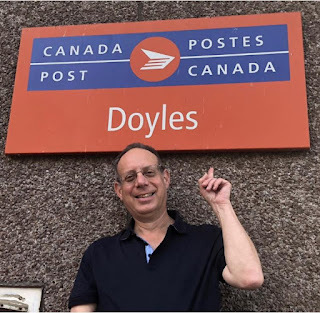
What is your favorite canonical story?
For this answer I have to cheat a little and name two, but let me explain why. My all time favourite to read and re-read is “The Man with the Twisted Lip.” Twisted Lip and twist at the end surprised me so much when I first read it the shock has stayed with me. Also, the thought of a journalist making more begging for pennies then on his set salary interested me enough, and who knows, may have helped me along to getting my degree in journalism and meeting JoAnn along the way.
The other story that I always have a fondness for is “The Adventure of the Copper Beeches.” Picture yourself as a young teen, in a small Canadian city on the east coast of Canada, a few stones throw from the Atlantic ocean. You are reading the tales of the world’s most famous detective. He dashes around London, beating the criminals and sees through the Victorian fog. You begin to read Copper Beeches for the first time and in the opening few paragraphs you come across the name of the city where you are sitting. A thunderclap couldn’t have been louder in my mind. When I read: “I have been a governess for five years,” said she, “in the family of Colonel Spence Munro, but two months ago the Colonel received an appointment at Halifax, in Nova Scotia, and took his children over to America with him..” I was amazed. Sherlock Holmes knows of Halifax? How could I not have this story as a favourite. There are also century-old copper beech trees in our neighbourhood.
Who is a specific Sherlockian that you think others would find interesting?
This is a difficult question to answer since editing a journal all these years we have come across so many interesting Sherlockians, some well known, some not so. However, I am going to suggest Mark Jones. Not only does he have a great first name, he is personable and writes a regular column on Conan Doyle’s non-Sherlockian works in The Strand for Canadian Holmes. Many Sherlockians will know Mark from the podcast he co-hosts with Paul M. Chapman, another name I could have easily featured in this answer, and cleverly just did! Mark’s knowledge of Conan Doyle’s works, influences and legacy makes his Doings of Doyle podcast a joy to listen to and an education at the same time.
What subset of Sherlockiana really interests you?
This is a tough question to answer as I have been a Sherlockian for so long my interests have changed. During my early days as a Sherlockian, and being a friend of John Bennett Shaw, collecting anything and everything related to Holmes was my focus. Any book, magazine, game, t-shirt or item that had a Sherlockian connection was brought into my collection. Because of those years my collection isn’t a large one on the international stage, but still dominates one room in our house. Many years later, after meeting more and more Sherlockians I realized my collection would never be a really large or important one and my interest shifted to writing and editing. Today I have a focus on Conan Doyle’s life with a particular interest on sports. Editing Canadian Holmes, however, can sometimes shift your interest for a while as you delve deeper into a topic on which an article has been proposed or submitted. The Sherlockian mine is a deep one and on any day I might follow a new vein.

What are some fond memories you have from your years of editing Canadian Holmes?
My wife JoAnn and I have been editing this quarterly journal for over 55 issues, that’s a lot of years and a lot of articles. Some years ago we started putting artwork from amateur artists on the cover. This has brought a bit more prominence to these artists. I take a lot of pleasure when I hear back from an artist about the positive responses they have had over their work being on our cover.
Working with prominent Canadian Sherlockians is always fun for a journal based in Canada but also making the journal an international one has also been rewarding. When you know your work is being read and enjoyed around the globe the hours and hours of work which goes into each 40-page issue seems to fall away.
You are known for your interest linking Arthur Conan Doyle to sports. What does research for combining those two topics look like?
A lot of the time, it looks like me at the computer searching and searching and searching newspaper archives, memoirs and sport histories. I believe that if we really want to know about the life of Conan Doyle we have to consider more than just his literary influences but also what he did and enjoyed day to day and without a doubt that is sport.
In 1999 I wrote to Dame Jean Conan Doyle and asked for some time to interview her about her father. From the reply I could tell she wasn’t that keen on it. When I mentioned that I wasn’t interested in talking about Sherlock Holmes but wanted to discuss her father and his love of sport, she agreed. What followed was a delightful conversation of her fond memories of an active and loving father. Of the long skis in the hallway and playing cricket on the lawn of their home. It was her interest in me wanting to tell that side of her father which assured me that I not only had the right topic for years of writing and research, but one that needed telling in a careful and detailed way.
When I am writing about ACD and baseball, cricket, cycling or any of the other topics I have written and researched about what I am really doing is contributing to our overall understanding of our favourite author. What made him place our dynamic duo on Baker Street? Certainly, it is in central London but it is also a short stone’s throw to Lord’s Cricket Ground. When he made Holmes a boxer, was he considering some of his own traits? This is a man who had a boxing ring built in his garage after all.
To know Conan Doyle, we have to understand his love and obsession with sport. It is a small niche but one I have found fun to dig into. After all, I also have a background as a sports reporter.
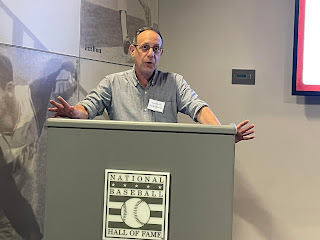
What book would you recommend to other Sherlockians?
With shelves and shelves of books it is difficult to lay my hand on just one to recommend, but if I had to, it would be Mattias Boström’s From Holmes to Sherlock. For me this book takes a unique view at a world that had been examined many times before. It is also a book which, I feel, exists because of the many books, articles and essays that went before it.
Mattias found a voice and an angle into our Sherlockian world which would interest even the most casual of Sherlockians, and could, with any luck, turn them into rabid, blog reading, podcast listening, meeting attending, researching Sherlockians who will then add to our world in their own way. I should also note that Mattias and I work together on the Sherlock Holmes and Conan Doyle in the Newspapers series of books published by Gasogene.
Where do you see Sherlockiana in 5 or 10 years from now?
I think our hobby is now on a curve of change, along with society. No longer do we have to attend far off conferences to hear this person or that person speak. We can stay home, turn on a Zoom meeting and meet Sherlockians from all over the world, hear their voices, see their faces and listen to their views on a wide variety of topics.
You no longer need deep pockets to fly here and there for a weekend of Sherlockian talks and fun. You can stay home and be just as well informed. You can reach out via email or social media and correspond with your favourite pastiche article, editor or writer.
I think in 5 or 10 years, many local clubs will have folded or morphed into occasional meetings of like-minded friends, and Sherlockians will find more and more ways to meet across the digital landscape.
July 30, 2023
Forming Most Devoted Friendships [SIGN]
Wow.
What a weekend.
Holmes in the Heartland ended a few hours ago, and after coming home and taking a nap, I can finally start to reflect on the weekend. And it was a great weekend.
First and foremost, the planning committee, Brad Keefauver, Heather Hinson, Kristin Mertz, Adam Presswood, Cindy Brown, Joe Eckrich, and Stacey Bregenzer, put in a ton of work and had to put up with a lot of emails and deadlines from me over the past year. So I want to publicly say thank you to them for helping to make a great event.
A detailed recap of the weekend will be posted on The Parallel Case of St. Louis blog in August, so I'm just going to highlight a few points on this post.
After all of the planning and finagling it seems weird to say that my favorite moment of the weekend came from an unscheduled moment, but that's the way it worked out.
After the speakers' program ended on Saturday, we had a two hour break before the dinner banquet so I ran up to my hotel room for a minute. Coming back down to the lobby, the elevator doors opened up and I saw the lobby bar PACKED with Sherlockians. All of our local Sherlockians were mingling with out-of-towners. People were spending time with their old friends. People were meeting new folks, some that they had only interacted with online or read the name of as a mention or byline in an article.
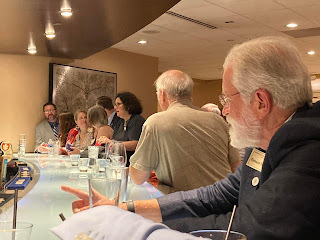
And a huge smile spread across my face. We created that moment. If we hadn't planned Holmes in the Heartland and enticed people to visit St. Louis in July, those people would not have been enjoying their time together right there and then. Some people never would have met the folks they did this weekend. Great conversations with old friends would've gone un-had. The smiles and laughs during that time would've been spent somewhere else with other people. But instead, almost a hundred Sherlockians were able to get together for a few days and enjoyed each other's company.
I've said it over and over, but spending time with other Sherlockians is my favorite part of this hobby. When we first started planning this Holmes in the Heartland, I wanted to make sure that people had plenty of time to spend with one another and I think we really pulled that off. So to everyone who was at the Sheraton Westport in St. Louis this weekend, I hope you had a great time with great people. Because that's what these events are all about.

* * * * * * * * * * * * * * * * * * * * * * * *
But, dang, did we have some great things happening as well! Here are some quick highlights from the weekend:
The small groups that found places to hang out as people arrived in town

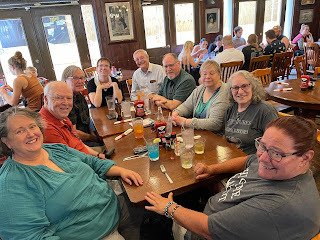


Saturday night's dinner. Hotel banquet food had no right to taste as good as that stuff did.
Hearing people marvel at how beautiful the St. Louis Public Library building is
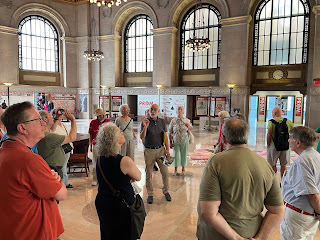
Seeing vendors fill people's hands with treasures. (One vendor completely sold out of every item they brought!)
The joy on people's faces when they'd win a door prize
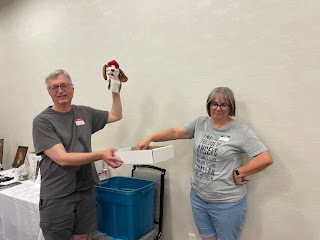
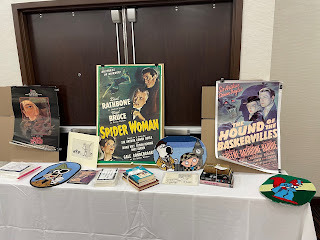
Watching Steve Mason waddle around the dinner tables dressed as a goose
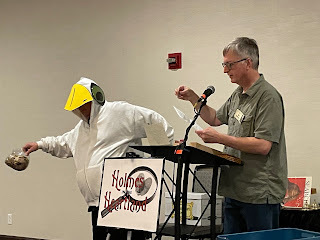
Seeing everyone appreciate and enjoy the history of St. Louis at the St. Louis Arch
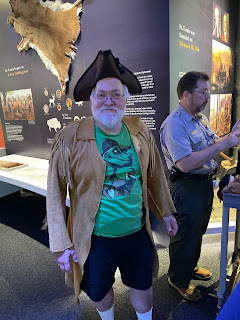
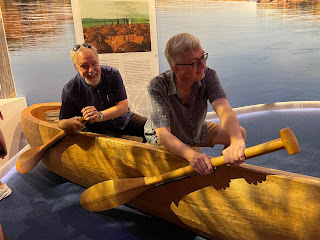
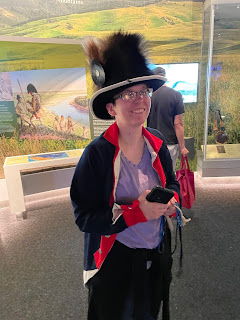

The presentations! So many great moments, but I will just highlight one from each presenter:
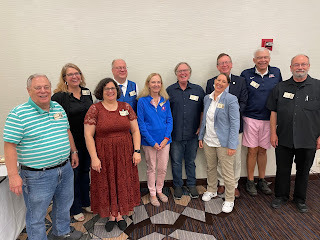
Ray Betzner being eminently likeable while talking about a despicable man character
Watching Kristin Mertz deliver her first-ever speech and looking like she's done it a million times
Cindy Brown connecting Victorian crimes to their present day counterparts and making us see we readers aren't so much smarter than these folks
Steven Doyle giving the complete opposite talk than what I thought (and worried) he was going to give
Mike McSwiggin complaining that he's tired of giving Sherlockian talks during the summer when he should be vacationing
Beth Gallego making me want to add too many titles to my already too long TBR list
Monica Schmidt getting a nice surprise at the end of her presentation
Joe Eckrich, Rich Kriscuinas, and Michael Waxenberg somehow making a 150 year-old court trial a hilarious recap of the day's events
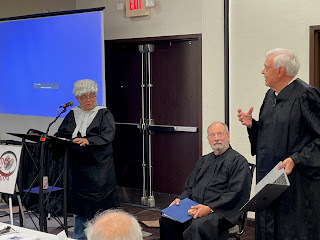
Thanks again to everyone who came to Holmes in the Heartland 2023. For those of you traveling back home today or tomorrow, I wish you an easy trip. And for those of you on the planning committee, get some rest. You deserve it!
July 23, 2023
Interesting Interview: Catherine Cooke
Catherine Cooke is a name I've always heard in Sherlockiana, but never got to know until recently. Lately, Catherine and I have been emailing on a project and she comes across as an immensely knowledgeable and professional lady while still conveying genuine charm and likeability through her communications. She's also been on a few episodes of the From Adler to Amberley podcast, and from listening to those episodes, it's clear that her good qualities abound in any form you get to enjoy her in!
For anyone who isn't yet familiar with Catherine, she is a very well-respected person in our hobby Catherine has managed Westminster's Sherlock Holmes Collection for over forty years. She is currently the chair of The Sherlock Holmes Society of London and has been an active member of that group since 1980, and has won their Tony Howlett Award and Tony and Freda Howlett Literary Award. But her Sherlockian bona fides aren't restricted to England! She is a member of ASH and BSI, has won the BSI Morley-Montgomery Award, and the Bootmakers of Toronto's Derrick Murdock Award.
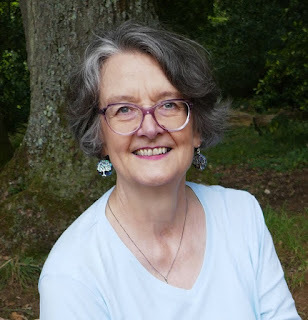
How do you define the word “Sherlockian”?
Someone who is interested in the Sherlock Holmes phenomenon – the stories, films, other books. Not necessarily all of it – some who is interested in the stories and, say, the films is just as much a Sherlockian as someone who is interested in the stories and the “Higher Criticism”
How did you become a Sherlockian?
My older brother wanted to watch the 1965 BBC series starring Douglas Wilmer as Holmes and Nigel Stock as Watson, and his small sister wasn’t going to go out of the room because he had his choice, so I watched as well and got hooked. I emphasise that I was extremely young at the time! I then found some of the early classic British books on the stories in the local library and my interest developed from there. We of course had the original stories on the bookshelves at home already.
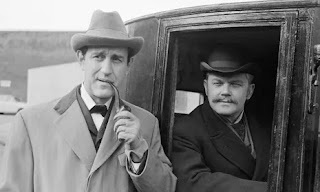
What was your profession and how did that affect how you enjoy being a Sherlockian?
I am a retired librarian. I got my first job with Westminster City Libraries after a chat with the personnel manager there, since it was close to Bedford College, where I was studying. I spent my entire career with Westminster, in various roles, but managing their Sherlock Holmes Collection for some 40 years. I now manage it as a volunteer. This has brought me into contact with Sherlockians from all over the world, and meeting others and hearing their take on matters Sherlockian is one of the most enjoyable aspects of our world.
What is your favorite canonical story?
“The Solitary Cyclist”. Violet Smith is no shrinking violet. Followed on a lonely country road, she doesn’t have an attack of the vapours – she tries to catch the man who is following her!
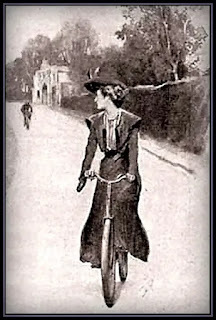
Who is a specific Sherlockian that you think others would find interesting?
It is difficult to pick on one person. Many of those I would have considered are no longer with us. If I must, then Jonathan and Elaine McCafferty (yes – I know that’s 2 people). They have a wealth of experience in the field, and a wealth of anecdotes – wonderful company.
What subset of Sherlockiana really interests you?
I think the settings of the stories. Conan Doyle grounded so many of them in places he knew, or used real events as inspiration. I find researching these aspects takes you down rabbit holes you would never otherwise be exploring.
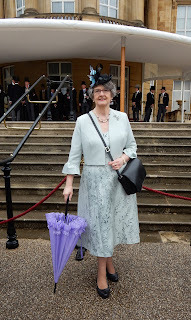
I've been lucky enough to have you as part of an upcoming anthology on important Sherlockian books, out next January. Can you tell everyone which book you wrote about and why you feel it is worthy of being in every Sherlockian's library?
Thank you. I covered In the Footsteps of Sherlock Holmes by Michael Harrison. This rather ties in with the previous question. Published originally in 1958, this was one of the first books about the stories, explaining what Holmes’ world was like - why he might have chosen rooms in Baker Street, what entertainment was available in London, what prices were like, how London and the suburbs were changing. It is an indispensable guide to the London and England that Holmes knew and worked in, so different in many ways from today’s.
As someone who has been involved with The Sherlock Holmes Society of London for many years, what are some of the highlights from your tenure as a member?
Now I feel old! Being able to meet and talk with Dame Jean Conan Doyle, and knowing people such as Tony and Freda Howlett, Stanley Mackenzie, Bernard Davies, Richard Lancelyn Green to name but a few. We are standing on the shoulders of giants. The various trips we have made – several in costume to Switzerland, but also our weekend trips to places like Southsea, Dartmoor, the Peak District, Norfolk and so on – visiting the locations where cases took place and hearing talks about them and the wider history of the area. And our Annual Dinners – the chance to socialise with so many of our members we don’t see very often, and hearing the speeches of people like Mark Gatiss, Stephen Fry or Nicholas Meyer.
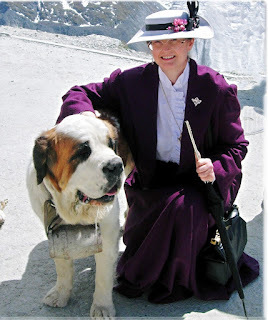
What book would you recommend to other Sherlockians?
This may be somewhat off the wall, but Sven Hedin’s two-volume account Central Asia and Tibet, published by Hurst and Blackett, London, in 1903. Volume 2 covers Tibet. They are available on the second-hand market or Google Books, if not from your local library. Holmes spent two years in Tibet - he must have traveled widely. Tibet is the highest and coldest plateau in the world. We should not, therefore, imagine Holmes traveling around on his own; he would require extensive supplies, pack animals, local guides and servants, as Hedin did. On a good day, they could cover 24 miles, compared with 12 or less in the mountains, though progress depended as much on the animals as on the weather and the terrain. We might also remember that Holmes was traveling under the assumed identity of a Norwegian. He might very well have entered Lhasa itself, disguised as a merchant’s servant or pilgrim from somewhere like Ladak or as a Buryat, disguises used by Hedin at various times. There are times when one has to be adept at sitting on the proverbial fence. Was Arthur Conan Doyle inspired by the newspaper account of Sven Hedin’s travels as he wrote Sherlock Holmes’ way out of that great chasm at the foot of the Fall of the Reichenbach? Or should we read Hedin’s adventures and allow them to throw some light on the experiences Holmes would surely have had while travelling in the East, about which he and Dr. Watson tell us so little? Hedin was not only an intrepid, brave explorer and gifted artist, he was an excellent writer and story teller, whose accounts of his travels are exciting and even funny page turners. Try Trans-Himalaya, New York: The Macmillan Company, 1909 as well. They are rollicking good reads!
Where do you see Sherlockiana in 5 or 10 years from now?
It is so hard to make predictions; I’m not sure I can. Who four years ago would have predicted the opening up of Sherlockian meetings world-wide using Zoom? I hope we’ll still be meeting in person to hear about and discuss new theories about the stories and the merits of new actors who have taken on the mantle. Younger Sherlockians will have new ideas, new fields of study.
June 30, 2023
Interesting Interview: Soren Eversoll
Did you dress up as Sherlock Holmes when you were eight years old? Well, this week's Interesting Interview did! Soren Eversoll met the Great Detective at an early age and never let go. He was a member of The Norwegian Explorers of Minnesota before he could drive, and recreated 221B in his parents' house so well that the Twin Cities' newspaper did a story on him.
But what I find really amazing is that Soren's interest in Holmes has never left him. How many of us can think of things that we found interesting as kids but faded away as we grew and life offered new opportunities? In fact, Soren, now a college student, presented at last month's Lone Star Holmes conference in Dallas. So let's hear from a Sherlockian who definitely keeps those Holmes fires burning, Soren Eversoll!
How do you define the word “Sherlockian”?
A Sherlockian is, most simply put, a person who loves Sherlock Holmes and actively pursues that love. I think that this does require some familiarity with Conan Doyle’s stories, though this does not need to be comprehensive and should be something a person fascinated with Holmes would want to do anyway. The world of Sherlockiana has exploded since the old BSI Morley days, which I think shows that Holmes has the legs to withstand changing consumer appetites and should be celebrated. Turning up one’s nose at someone who’s entry point is the BBC show, which happens to be most of my generation, is corrosive to the whole idea of passing the torch forward and letting Holmes be Holmes for a new set of devotees. Nonetheless, a good Sherlockian might then direct that person towards the canon, as it is the foundation for everything else and a great read anyway.
Overall, however, I think a Sherlockian is just a person who puts down whatever form of Holmes content they have been consuming and feels that enjoying it is simply not enough, that they need to make something in response, or collect, or seek out others who feel the same way. It is that active pursuit, I think, that captivation with whatever lit the first spark, that really separates someone who just likes Sherlock Holmes from a dyed-in-the-wool enthusiast.
How did you become a Sherlockian?
When I was seven I used to take swimming lessons at the University of Minnesota. My mom found an abridged audiobook collection of Holmes stories at our local library, including “The Speckled Band” and “A Scandal in Bohemia”, and started playing them to me in the car to and from my lessons. I can’t really pinpoint now what drew me so much to the stories, though it was probably some combination of the crime, the historical period, and the character of Holmes—after that I was completely hooked and wanted to hear the audiobooks over and over again. My mom encouraged me to talk to my grandpa, who had a big leatherbound collection of the entire canon with the Paget illustrations. I remember poring over that book when I was a kid—when we went to my grandparents’ house it was the first thing I went for. It was around then that I started building a small recreation of the 221B sitting room in a tiny basement closet, mostly out of construction paper taped to the walls and little antiques I’d found. That really deepened my interest and forced me to go over the stories again to find the small elements of the room that I’d missed.
I got connected to the world of Sherlockiana through Jake Esau, an actor in my local library circuit who would give performances as different literary or historical figures such as Edgar Allan Poe, P.T. Barnum, Dracula, and, of course, Sherlock Holmes. I showed up to enough of his events and asked enough questions about Holmes that he eventually got me in touch with Minnesota’s scion society The Norwegian Explorers. The people in the Explorers were extremely welcoming to an obsessive little eight year old—through them I started attending monthly meetings and deepened my love for the stories and the playing of “The Game”.
What is your profession and does that affect how you enjoy being a Sherlockian?
This fall I’ll be a senior English major at Carleton College, a liberal arts college in southern Minnesota. Being a college student primarily studying literature has fundamentally changed the way I approach the Conan Doyle stories—rereading them today I find that I’ve become equally interested in Conan Doyle’s prose style and the evolution of that style across the stories, as well as the different narrative structures he employs and what exactly makes them so effective. I think that my academic environment (and most across the country, I’d wager), is now very focused upon exploring if the conventional ‘literary classics’, most of which were written by well-to-do white men, are still relevant to readers and the study of literature in general. While I think that many are, and in no way consider Conan Doyle a concerning literary figure on the level of H. P. Lovecraft, I do think that there’s an interesting conversation to be had about what makes certain stories timeless and resonant even though some of their more unsavory elements (I’m looking at you, The Sign of Four and “The Adventure of the Three Gables”), exist, as well as the value in understanding works of art as products of their time, reflective of moral deficiencies that we may now balk at.
What is your favorite canonical story?
This is probably cheating but I’m going to include “The Final Problem” and “The Adventure of the Empty House” as one big story. In “The Final Problem” I love the character of Moriarty, a villain who actually has the mental power to undo Holmes, the canonically unique cross-country adventure through Europe, the near-cinematic confrontation at the Reichenbach Falls—one of the most iconic images in literature, I’d argue—and Watson’s absolutely heartbreaking final description of his friend as “the best and the wisest man” he has ever known. This story is just pure fun and the death of Holmes is such an unexpected left turn that when I read it for the first time I remember setting my book down and spending a good couple days actually thinking that that was the end.
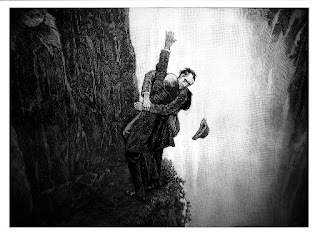
I think the unconventionality of “The Final Problem” goes wonderfully with the more standard mystery of “The Adventure of the Empty House”, which brings the detective back to London and provides everything that I want in a classic Sherlock Holmes story—a seemingly-impossible killing, a late night stakeout, the bizarre trickery of the bust, and a wonderful second-in-command to Moriarty manifested in the odious Colonel Sebastian Moran, my favorite of Holmes’ antagonist after Baron Gruner. I also adore Holmes’ disguise as the book peddler, his reveal to a fainting Watson, the description of what really happened at Reichenbach (baritsu!), and everything the detective has gotten up to in the meantime. There’s so much juicy information here about Holmes’ character and I think the story portrays a deepening of his relationship with Watson that keeps me coming back, even though not a lot of deduction goes on in the case itself.
Who is a specific Sherlockian that you think others would find interesting?
Karen Murdock (ASH) is a really wonderful Sherlockian based in the Twin Cities—she is a longtime member of The Norwegian Explorers with a special interest in unique figures of speech found in the canon. This includes instances of hapax legomenon (in which a word is only mentioned once across the four novels and fifty-six short stories), assonant phrasings, anaphora (the selective repetition of a certain word), and much more. A lot of this work can be found on the online discussion group The Hounds of the Internet, of which Karen is a frequent contributor. On top of this she is one of the kindest, most generous people I know—when I was building my second 221B in middle school Karen would always come by to my house with old books she had picked up that she thought would be good additions to the room.
What subset of Sherlockiana really interests you?
This is probably obvious from my previous answers but I am especially interested in recreations of the 221B sitting room—this can manifest itself in maps, miniatures, sets for films and TV shows, and life-sized recreations built by enthusiasts. There is something about the realization of the iconic room and the unique interpretation that every creator brings to their space that I find thrilling—Conan Doyle peppers enough little inconsistencies and throwaway details through the canon to make the mapping of the place’s layout a scholarly project unto itself, which becomes as much about personal creative expression as an experiment in close reading.
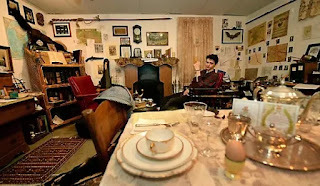
I’ve also become more interested in the early history of Sherlockiana, particularly pertaining to the old BSI days of the thirties and forties. While there was a lot that was exclusionary about this culture, I find the development of “The Great Game” and Sherlockian scholarship, which would pave the way for all forms of modern fandom, to be a fascinating portion of our history that I would love to further research.
As someone who has grown up being a Sherlockian, how has your activity in this hobby changed as you've grown?
I would say that the biggest difference between my early days of Sherlockian interest and today is that I’ve now known some of the people in the community for over a decade now, and thus feel a deeper connection to the social aspect of Holmes scholarship than I did in the past. I’m also at an age where I can independently go to conferences and meetings without forcing my poor parents to shuttle me someplace, as well as have a drink or two—at past conferences when I was a kid there was always a certain point in the night where I just had to go to bed, which isn’t the case anymore. As my abilities as a writer have improved I’ve also become more interested in actively contributing to Sherlockian scholarship, which I didn’t feel I had the chops to do in the past.
At the Lone Star Holmes conference, you gave a talk on Sherlock Holmes and psychogeography. Could you explain that term and how you linked Sherlock Holmes to it?
Psychogeography was a concept that one of my Carleton professors introduced me to—essentially it is concerned with the way an individual's environment, specifically within a city, consciously and unconsciously affects their behavior. Psychogeography has manifested itself in many different forms over the years but my professor specifically pointed me towards the work of the French scholar Michel de Certeau, whose 1984 book The Practice of Everyday Life has become a seminal text in the field. In one of the book’s essays titled “Walking in the City”, de Certeau argues that the modern city has become increasingly subjugated to the designs of governments and corporations who wish to find ever more subtle ways of controlling the citizenry and selling things to them. An example I gave at the conference of a non-de Certeauvian way of approaching a city such as London would be to instantly go to the Hard Rock Cafe in Piccadilly Circus, buy a couple of T-shirts, and then do everything else that appeared on the first google search of the best things for tourists to do in London. De Certeau likens this way of approaching a city to the view one gets of it from atop a skyscraper, which mutes the complex life happening on the ground below and makes the city seem conquerable, knowable to a single person and their worldview (which in reality it never can be, except maybe to Holmes).
In contrast to this approach, in his essay de Certeau outlines “tactics” of operating within the city that upholds ordinary human life and works as creative resistance against the all-controlling desires of companies and the state. Some examples of these are walking amidst a city’s people, taking shortcuts that are not officially mandated, and interacting with neighborhoods that are not commercially-driven and more representative of the life of the average citizen. In my talk I argued that Holmes derives his success as a detective from his awareness that true knowledge lies not from the view on a skyscraper (an overly-simplifying approach that I liken to Watson and Scotland Yard) but from being intimately attuned to a city’s people and its many neighborhoods, exemplifying de Certeau’s psychogeographic strategy. This, I argued, could be seen in the detective’s usage of the Irregulars and agents like Fred Porlock, his exploration of grimier London areas that most Victorian gentlemen wouldn’t dream of setting foot in, the moments where he acts as an unofficial arbiter of justice, and his unabashed love for all that is bizarre in human behavior.
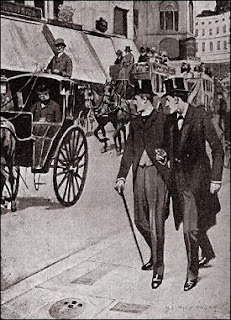
What book would you recommend to other Sherlockians?
Maybe everyone has already read this but The Devil in the White City by Erik Larson is a magnificent piece of historical non-fiction that interweaves the story of the 1893 Chicago World’s Fair with that of the serial killer H. H. Holmes, who constructed an elaborate “Murder Castle” during the time of the fair in which he disposed of and concealed his victims. Written like a novel and just as engrossing, this book serves as a fascinating insight into not only one of America’s first recorded serial killers but also the gargantuan accomplishment of the World’s Fair, an extremely ambitious project that was plagued with difficulty and represented America’s assertion of exceptionalism and innovation that would foreshadow Great Britain’s decline as the world’s leading superpower. This book not only checks the murder box for Sherlockians but is also very evocative of the late nineteenth century world that Conan Doyle so brilliantly captured in the stories.
Where do you see Sherlockiana in 5 or 10 years from now?
This is a very difficult question to answer. I am confident that the character of Sherlock Holmes will continue to connect with people in many different forms—through pastiches, television, movies, video games, board games, etc.—as he has done for over a century. I am also sure that social media will continue to connect like-minded Sherlockians across the world in new and exciting ways, promoting a dearth of possibilities for conferences and other events (Zoom, as annoying as it is, has really increased the opportunity for the accessibility of things like these). In modern pastiches and adaptations I think that we will see the characters in the canon further evolve in ways that are slightly (or extremely) different from their original portrayal in the stories, as so much of our modern understanding of them is also filtered through their representations in pop culture (for example, in recent years I think we have seen Holmes grow a little colder and more socially fringe than he ever was in the stories, with further emphasis on him being a form of a superhero, itself reflective of our Marvel/DC dominated media landscape). While some might view this as a form of blasphemy, what excites me is that people will still be interacting with these characters and coming up with new things to say about them. I am slightly worried about the future of the stories themselves—in my generation (I’m unabashedly counting myself as a victim of this), I think there are fewer people who go to books as their primary source of entertainment, especially those written in the nineteenth century. But if any stories survive they will be Conan Doyle’s, which remain so gripping that I’m shocked they’re as old as they are. Whatever happens, Holmes and his world of 1895 will remain an object of fascination and reinterpretation that I can’t wait to witness.
June 7, 2023
Life in Social Strata [VALL]
But I do want to take a moment to highlight the best part of any Sherlockian gathering is for me.
It's the Sherlockians. And although it isn't official, I wanted to point out two things we are doing in St. Louis next month.
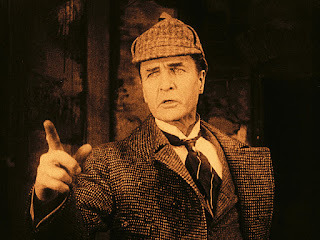
First, The Crew of the Barque Lone Star purposely built in socialization time in between speakers at the Lone Star Holmes conference and that was an essential takeaway for me. So the Holmes in the Heartland speaker schedule will be two presentations and a break, two presentations and a break, etc.
Need to run up to your hotel room? You're covered.
Was there something at a vendor's table you wanted to revisit? You've got time.
Feel like you'd like to talk to some folks and stretch your legs? Get up!
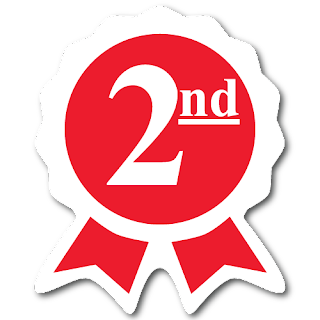
And the second thing is something I've seen Holmes, Doyle, and Friends do so well: The nightlife.
The Sheraton Westport Plaza was chosen for Holmes in the Heartland because of all of the restaurant choices within walking distance. It's got options for everyone: Sushi. Tacos. Diner food. A deli. Japanese steakhouse. Bar food. McDonald's. And if you've ever been to a Sherlockian event, you know that all you have to do is be in the hotel lobby when a group is heading out and they will drag you along. All of these dinner options were chosen so that people wouldn't stay strangers long!
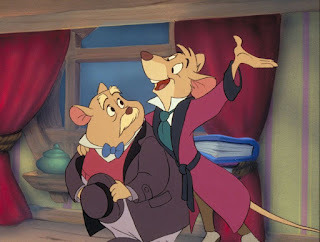
Unfortunately, the hotel bar situation has changed since we booked everything back in 2020, and there isn't a in-house tavern for us to take over. But let me tell you, Westport Plaza has one of the coolest bars you could imagine, Westport Social. Drinks and tables to hang out? Sure. But it's also full of shuffleboard, ping pong, basketball, and more. Once again, right in walking distance to the hotel so you are set for Friday and Saturday night!
And yes, Sherlockian conferences have entertaining and informative talks, tantalizing vendors, pleasant meals, and more. But for me, these events are about being able to spend time with other Sherlockians. And trust me, we've made it a point for you to hang out with friends both new and old at Holmes in the Heartland next month. So if you haven't signed up yet, now's the time!
May 30, 2023
Sherlock Holmes in the 21st Century
I was asked to speak on the future of Sherlockiana. Below is the text of my speech with plenty of slides. Enjoy!
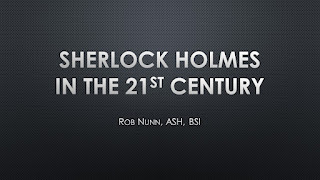
Good morning, everyone! I’m very excited to be here and talking about Sherlock Holmes in the 21st Century.
But before we get into that, I’m sure everyone is expecting some allusion to a cartoon that the rest of the world has forgotten about. So here you go:
Now that that’s out of the way, you’re welcome for getting that song stuck in your head this morning.
While we aren’t going quite THAT far into the future, I am going to ask us to move forward from the “Always 1895” mentality today. Notice, I said “move forward” and not “leave behind.”

Because once we lose our footing in the Canon, chaos ensues.
Since 2018, I’ve run a series of interviews on my blog, Interesting Though Elementary, titled Interesting Interviews. So far, I have interviewed 90 fellow Sherlockians.
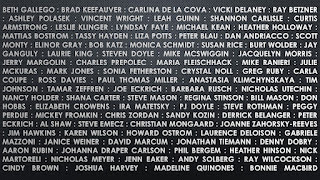
Each interview is ten questions long, with a few tailored to the specific interviewee. But every interview includes questions about how they define the word Sherlockian, how they became Sherlockians, their favorite Sherlock Holmes story, another person in our hobby that they find interesting, and a book they would recommend.
But the purpose of this talk is the future of Sherlockiana, and that is addressed by the last question that has ended each of the 90 interviews: Where do you see Sherlockiana in 5 or 10 years from now?
As interesting as I have found each and every interview, I won’t read every response to this question to you today. But I would like to highlight a few here. Michael Kean, Wiggins of the Baker Street Irregulars, responded, “I believe that the world-wide interest in Sherlock Holmes will continue. It may be cyclical, but it will continue to expand, especially internationally. Critical to its longevity, however, is our ability to interest the younger generation in Holmes and Watson.”
Barbara Rusch said, “The popularity of Sherlock Holmes will never wane, and each succeeding generation has a new take on the quintessential detective.”
Tim Johnson answered, “I would desire a younger and more diverse Sherlockiana. The promise is there. But it will take hard work; meaningful and deep relationships; and open arms to make it a reality.” Texas’s own Cindy Brown said, “I think we will be finding new ways to share our hobby with others, whether it’s virtual or some other social media, but I think we will continue to meet and share, and collect, and exchange our ideas.”
And some guy named Don Hobbs answered with, “There have historically been up and down periods of Sherlockian enthusiasm however we have been on an extended up period. With the growth of social media, I don't see a lull for the near future. There seems to be new blogs, new books, and new societies every month. I think in 15 years we will look back at the early 21st century as the Goldest of Golden eras.”
To be honest, I really tried to practice saying this in a Don Hobbs voice at home, but my wife said I was scaring the dogs so I had to give it up.
But as you can see, Sherlockians have high hopes for the future. But how do we help that happen?
I think there are a few guideposts for us to follow as we look to the future of this hobby, Planting Seeds, Recruitment, Community, and Mentoring.
PLANTING SEEDS
I find myself constantly thinking about the interactions that Sherlockians have with one another. And the biggest influence on that train of thought is my profession as a school teacher. For the past nine years, I’ve taught a two-week language arts unit on Sherlock Holmes to my fifth graders.
Over these ten days we read abridged versions of "The Blue Carbuncle," "The Red-Headed League," "The Speckled Band," "The Copper Beeches," and "A Scandal in Bohemia." And from these stories, students learn about story elements such as setting, plot, the role of a narrator, and rising action. They also create their own mystery stories and put on Sherlock Holmes plays for other classes.
But these 10 and 11 year olds don’t start out knowing a ton about Sherlock Holmes. Just like many newer Sherlockians don’t know as much about the Canon as the more seasoned folks in this hobby. Heck, I’ve met some people at meetings who’ve only read their first story!
Don’t you just get so excited for people at that stage, whether they are a kid or an adult? They have so much in store!They’ve yet to hear
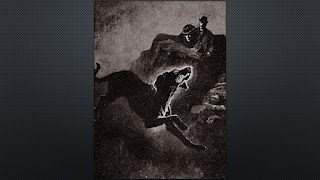
“Mr. Holmes, they were the footprints of a gigantic hound!”
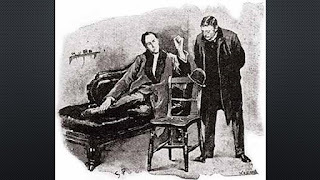
or see Holmes’s tour de force of deducing Henry Baker’s character from his hat
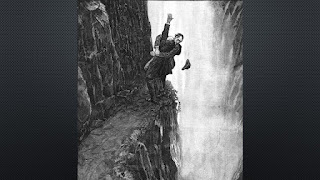
or knowing what happens at Reichenbach Falls.
Sometimes I’m even a little jealous of people who are coming to this hobby for the first time. There are so many great stories and experiences ahead of them!
Now, of course, not everyone we talk to about Sherlock Holmes will become Sherlockians. I’m sure many of our spouses can prove that point.
And while there are plenty of my students who do the required reading and get through the lessons because they have to, there are always others who show an interest in the Junior Sherlockian Society, or write pieces for the Beacon Society’s Joel Senter essay contest, or pick up pastiches for younger readers in their free time.
But whether they are penning award winning essays or arguing with other kids about who really won between Holmes and Irene Adler, every kid that gets engaged with Sherlock Holmes is a win for me. Because every new exposure to Sherlock Holmes is a possible future Sherlockian. And as much as we would love for everyone exposed to Sherlock Holmes to become a lifelong fan immediately, some may take longer than others.
That’s why I’m calling this section “planting seeds." Because you never know when future Sherlockians will sprout from what we do. Many of my 5th graders are just starting to branch out and cultivate their reading preferences. And throughout the school year, I have to ease many readers into the amazing titles out there without scaring off the emergent readers.
We’ve got to ease a lot of possible Sherlockians into our hobby as well. And as hard as it is, we can’t judge people’s interests.

Any interest that a student or adult that has in Sherlock Holmes is a valid interest. I don’t know of a single Sherlockian that I agree with 100%. One of my closest Sherlockian friends thinks this is a great movie!
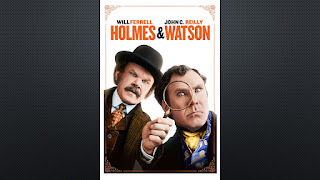
And even if I can’t see eye-to-eye with him or the 9 other people who actually watched that thing, I know they are still great Sherlockians. So if I don’t agree with everyone on their Sherlockian interests, how can I expect a new Sherlockian to conform to all of my beliefs and interests?
I can’t.
And if I dismiss the things they like, they’re probably going to dismiss the things that I like just as quickly. I know that helping my students to grow works best when I am there to guide, and not lecture them on what they should enjoy. And any interaction with a future Sherlockian could benefit from the same approach.
New Sherlockians may not be ready to join a scion society or read the whole Canon for many different reasons. They may be unsure about their interests, have kids and not a lot of free time to themselves, maybe they just enjoy watching the movies here and there, or a million other reasons why now is not the right time for them to jump into this hobby.
But if somewhere down the road they remember Sherlockians as people who embraced their interest and appreciated the commonalities, we may just have someone that will join us when they are ready.
And it’s what we do with those future Sherlockians when they are ready that is really important.
RECRUITMENT
Another important topic to keeping Sherlockiana going is recruitment. We can all think back to certain Sherlockians who welcomed us to the fold and helped us along our way. But one Sherlockian in particular went out of their way to help this hobby grow immensely, and purposefully created an atmosphere that was so welcoming you couldn’t help but want to stick around.
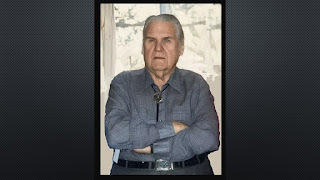
I think we can all agree that the Sherlockian world would look very different today without the influence of John Bennet Shaw. By a show of hands, how many of you in the audience knew John Bennet Shaw? Imagine what this conference would look like without Shaw’s influence on those people here today.
The John Bennett Shaw conferences were a traveling roadshow meant to bring Sherlockians both new and old together. While these events were before my time, Ray Betzner has always talked about the importance of a Shaw workshop in his Sherlockian life:
“The best place to meet the broadest range of Sherlockians was at a JBS conference. So many newbies had their first experience of the Sherlockian community at these events, which welcomed teen-agers and old-agers alike. And here is what was most remarkable: John would deliberately greet everyone during the course of a few days. And if he found you sitting by yourself in the back row of a room, he would do something enormously kind, like invite you up to his room after hours. John’s room was as private as Grand Central, and almost as busy. EVERYONE filtered through there sooner or later, which meant that you would interact with folks from all over the country. By the end of the conference, newbies started to feel like they belonged.”
“John would deliberately greet everyone during the course of a few days.”
“Newbies started to feel like they belonged.”
I think there is a direct correlation between those two sentences.
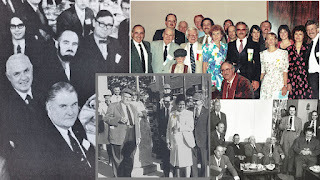
John Bennett Shaw was out there not only being the Johnny Appleseed of Sherlockiana by educating people about Sherlock Holmes, but he was deliberately making everyone feel welcomed.
Take a second and look around the audience here today. I hope there are faces you don’t recognize. And I hope you take Shaw’s example and go meet some new folks today and make them feel like they belong.
Ray told me that “John respected the history and traditions of the BSI. But he also knew the group needed to start evolving if it was to thrive.” Ray also said that “John knew the BSI needed to diversify.”
While “evolving” and “diversifying” in Shaw’s time meant nudging the BSI to go co-ed, we Sherlockians can still look to evolve today. Do we expect Sherlockians to act and behave the same way they did in the 90s? Or the 60s? Or the 1930s?
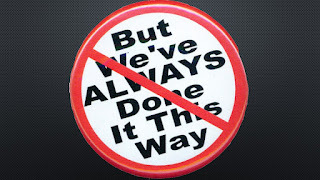
Sherlockiana isn’t some stubborn institution of rigidity. Personally, I don’t want to be someone who won’t be open to a new experience because it is different from the ways things have always been done before. Sherlockians of all shapes and sizes should not only be welcomed, but recruited to join activities like what we are doing this weekend.
It’s one thing for us to say that everyone is welcome and leave it to folks to walk in the door on their own. But it’s a lot less daunting to come into something where you have been specifically invited and you know a friendly face or two.
Look, I’m a straight, white, middle-aged, Christian male, so I don’t have much experience with feeling like a minority in a group. But there have been a few times when I wasn’t sure if I fit into a group of people.

It can be very intimidating to think that everyone else in a group is smarter than you or knows much more of the history of a hobby you’re interested in. But I don’t want anyone to ever feel that way when it comes to enjoying Sherlock Holmes.
So we shouldn’t just SAY we are welcoming. We need to get out there and ask people to join us. Maybe it’s a scion meeting, maybe it’s something as simple as inviting them to sit by us at a dinner, or reaching out to someone on social media. Things that seem simple and almost inconsequential to us could make the difference in making a new person feel like part of the group.
Another proponent for welcoming recruitment is Steven Rothman, editor emeritus of the Baker Street Journal.
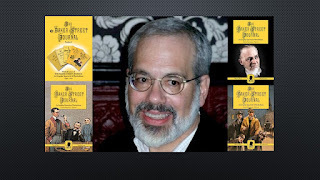
Here are a few quotes from his Editor’s Gas Lamps over the past decade:
From Spring 2015 in reference to Sherlock Holmes being a cultural icon:
“All of this is to the good. We have had fun with Sherlock Holmes since childhood and are quite pleased to share our delight with others. It is not necessary to know Christ’s four-letter codes or to memorize the order of the stories. Sherlockian literacy should be the only shibboleth to joining our never-ending conversations. And even that should be broadly drawn. If you know well your cinematic or televisual Holmes, or if you cosplay Holmes or create new adventures, you can find your place among Sherlockians.”
In Spring 2016 Rothman described Sherlockiana as
“A family reunion with a family that one has sought to join and that has welcomed you into its midst.”
And the Autumn 2021 edition of the Baker Street Journal espoused:
“When a friend asks what it is all about [Sherlockiana], steer them to one of your favorites, invite them to a meeting of your local society, lend them books and copies of the Journal… When you take someone - young or old - by the hand and lead them down Baker Street, you never know when that experience will click, when you will have made not only a deeper friendship, but a brand new Sherlockian.”
Just like The Baker Street Journal has told us time and time again, we have to remember that people come to Sherlockiana for fun and amusement. We all know that Sherlockians make for great company, but WE have to be the ones who make sure that Sherlockians are also welcoming.
COMMUNITY
And once new Sherlockians are welcomed, it’s important for us to build community with them. I started this talk out by citing my blog posts called Interesting Interviews. I titled it that because I really do think everyone I’ve met in this hobby is interesting. We’ve all built friendships and communities up from our time here.
But man, have the times changed since you’d sit down to spend an evening writing letters to like-minded folks across the country. Did the internet change Sherlockiana? No.
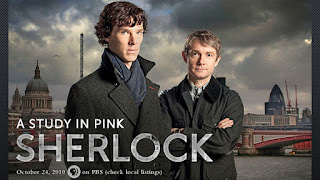
It was the year 2010 and some guy named Benedict Cumberbatch had just burst onto the Sherlockian scene with “A Study in Pink,” the first episode of BBC’s new show called Sherlock. That one show, with only 13 episodes, gave a jolt of energy to Sherlockiana not seen since Jeremy Brett, The Seven-Per-Cent Solution, or William Gillette.
And some of us were scared.
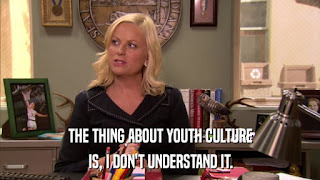
What was this new type of Sherlockian, one who didn’t refer to The Grand Game, but instead called it Fandom? Traditional avenues of publishing were being ignored for posting fan fiction on the internet.
And they were all so…. Young…
Did these new Sherlockians all flock to scion meetings or the BSI Weekend? Not necessarily. Many new folks found a place where they were welcomed with open arms.
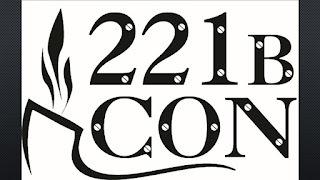
221B Con just celebrated their tenth anniversary this year. While some Sherlockians are quick to dismiss the convention as one that isn’t up to their standards, that’s a tired argument that should be put to rest right now. So let me share the titles and descriptions of some of the panels from just this year:
Adventuresses of Sherlock Holmes, Baker Street Irregulars, and other Sherlockian Societies - A look at the world's most famous Sherlock Holmes organizations.
Free At Last: Sherlock Holmes and the Public Domain - As of January 1, 2023, all the SH stories are in the public domain. But do you know the story of how they got there?
Paget, Steele, and Gibson: Illustrators of an Era - When the Strand Magazine was founded in 1890, Arthur Conan Doyle immediately saw the promise for a series about Sherlock Holmes, the detective who'd made his first appearance in 1887. The next two decades were the height of the ""Golden Age of Illustration.""
Sherlock Holmes’s Past - Arthur Conan Doyle provided minimal information about Sherlock Holmes's past. What can be gleaned from those few tidbits that can tell us about his upbringing and education? What has been embellished by other writers? What would others like to know?
These panels sound like they would be right at home at this conference, as well as other Sherlockian gatherings around the country.
Some other topics from 2023 included
Animals in the Canon, Drug Use in the Victorian Era, Enola Holmes, Research for historical fiction writers, Laurie R. King and Mary Russell, Popularity of the Pastiche, and Sherlock Holmes in Comics
So now we can all agree that 221B Con is a hotbed of Sherlockian activity, both traditional and new wave. But the community aspect is what is applicable to us here today.
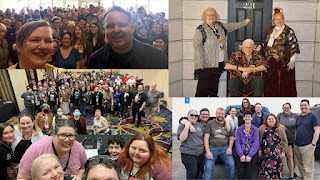
When Crystal Noll and Heather Holloway signed a contract with the Atlanta Marriott for their first convention, they hoped to have 75-100 attendees that first year. Over 700 people signed up. Let that sink in for a minute.
700 people
There is a huge community of new Sherlockians out there. We’ve talked about the importance of recruiting new Sherlockians to join our activities, but it’s also important to build that community with like-minded folks. And that community we build should be a motivational and welcoming one.
If my own students don’t feel welcomed in the environment I’ve created in my classroom, my lessons are doomed. And if Sherlockians don’t feel welcomed in environments that we want them to join, our future with them is doomed as well. 221B Con is a great example of a welcoming community based in its love of Sherlock Holmes.
Here’s a story that Heather shared with me that happened in 2016:
“The hotel that we were at that year was also hosting a group of volleyball players from different high schools for a tournament of some kind. I was walking through the lobby when a 14 to 15 year old girl stopped me because she saw my director’s badge.
“She was with her father and she was breathless with excitement. She said that she LOVED Sherlock Holmes. She watched all the BBC shows and then she read all the stories. She even showed me her phone case which had a 221B door on it.
“Her father said that she was so excited when she saw that there was a Sherlock Holmes con in the hotel. She begged him to let her walk around. He said that all she ever talked about anymore was Sherlock Holmes, and that she had never been to a con.
“I took her to our operations room and gave her a few Sherlock Holmes related items like a mug and a couple of extra books we had. I just love the thought that there are so many young people coming to Sherlock Holmes and that, if they find us, we can be a nice supportive community for them.”
This is a great example of the welcoming spirit of Sherlockians!
We want to welcome fellow readers no matter where they are on their Sherlockian journey. And hopefully, we all have local Sherlockian communities that are just as welcoming.
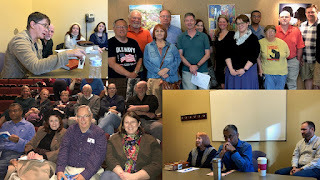
I’m the Gasogene of my local scion, The Parallel Case of St. Louis, and I love the setup our founder, Joe Eckrich, came up with. It’s more of a book club format where everyone is encouraged to participate in discussions. Sure, papers are welcome, but what we really want is conversation.
We have had so many different areas of expertise shared in these discussions that would have been missed if we hadn’t welcomed and encouraged people to share their thoughts. This format allows everyone to be engaged and take on roles and responsibilities that they are comfortable with.
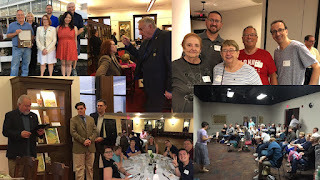
And from that small way of including people, members have helped coordinate conferences, given talks, written blog posts, swapped books, hosted movie nights, and have found all kinds of other ways to strengthen the community feel of our group!
Because Sherlockiana is all about the friendships. Sure we love a good talk or a quiz, but we keep coming back to events and gatherings for the camaraderie.
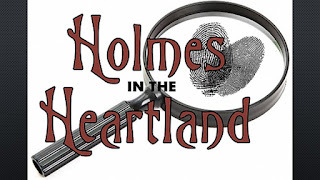
And here we stop for a quick commercial.
If you’d like to see this camaraderie in action, please join us this July in St. Louis for the second Holmes in the Heartland weekend!
Join us for a tour of the St. Louis Sherlock Holmes Research Collection and architectural tour of the historic St. Louis Central Library!
Enjoy a day of Sherlockian speakers expounding on the topic of Arch Enemies!
Spend way too much money at our packed venue of vendors!
Relish in a dinner surrounded by fellow Sherlockians and be entertained by The Alpha Inn Goose Club Trivia performance!
Take a trip to the top of the St. Louis Gateway Arch and enjoy lunch at a riverfront restaurant!
Information can be found in the flyers you received this morning and on the Holmes in the Heartland website!
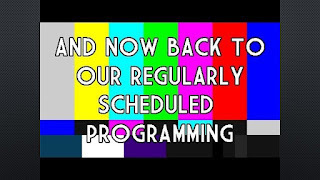
Now, where was I?
When the world went all awry in 2020, Sherlockians still found a way to meet. Because it didn’t take long for us to realize that we love the stories, but we NEEDED other Sherlockians.
I’ve heard it said that this hobby is more about hanging out now than debating important ideas and that we write more about relationships between the characters instead of writing about hard data like it used to be in the good old days.
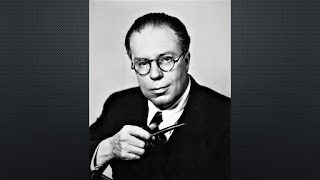
While I haven’t done a statistical analysis of Baker Street Journal articles comparing those categories, I will say that in 1944 Christopher Morley edited a book titled “Sherlock Holmes and Dr. Watson, A Textbook of Friendship.” And if friendship and community are good enough for Christopher Morley, it’s good enough for me.
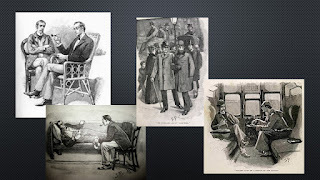
Just like friendship is a theme throughout the Canon, it’s a theme throughout the century of this hobby.
I know that students learn better when they feel safe and appreciated, and the most active Sherlockians are probably the ones with the strongest social bonds. It’s important to remember that Sherlockian friendship isn’t something that always happens naturally. Sometimes it’s something that we need to foster. The stronger we build our relationship and community, the stronger the future of this hobby will be.
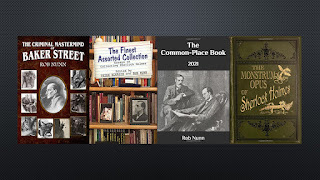
Over the past 6 or 7 years, I’ve found myself in the middle of some great communities by putting out a few books. Like many Sherlockians, I tried my hand at a pastiche first. And later, a friend of mine, Peter Eckrich, pitched the idea of an anthology of Sherlockian collecting.
We rounded up 27 folks to contribute essays on their interests inside of Sherlockiana. Whether it was autographs, art, experiences, or greeting cards, I was blown away by the passion that each contributor shared.
Editing that book, The Finest Assorted Collection, was when I knew I’d found my sweet spot. Writing on my own was fine. I still write papers here and there, but collaborating with other Sherlockians is what I really love. Being able to bring people together around a central theme is a real delight!
Since that first anthology, I’ve been able to work with Brad Keefauver on an off-the-wall collection called The Monstrum Opus of Sherlock Holmes and Peter Eckrich and I have another collection coming out next January on Sherlockian books.
As someone who loves reading and connecting people with books they’d enjoy, getting my own books out in the world is so great, but the real fun in this whole process is the community I’ve been able to be a part of as I’ve collaborated with writers. Whether it’s bouncing ideas back and forth, or just nit picking the placement of a comma, I can honestly say that every person I have worked with in these books has proven time and time again that Sherlockians are great people.
And no matter what Sherlockian communities we find ourselves in, they will be enhanced by us taking steps to bring people together. But like I said, these communities won’t always look like what we are used to. I think some folks may look at newer Sherlockians and worry that everything is going to change. And that is where the fourth guidepost comes in.
MENTORING
This is the fun one.
Mentoring is where we get to show new folks all of the great aspects of Sherlockiana. But there’s a reason I’ve put this one last. Because without planting seeds, recruitment, and community, mentoring just comes across as lecturing. I’m sure we’ve all had someone show us the slightest interest in Sherlock Holmes before.

And if you’re anything like me, you immediately want to load them up with ten books, six movies, three television series, and an entire database of the history of this hobby.
If we give into that instinct to bombard the newbie immediately, they’re so overwhelmed that they never want to mention the name Sherlock Holmes around us again!
New Sherlockians aren’t just new recruits for us to preach at. It’s up to us to get new Sherlockians to be active. Fostering a good back-and-forth between different knowledge levels can lead to some wonderful discussions.
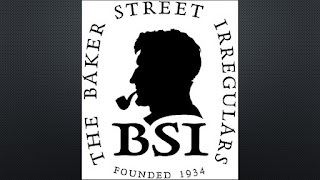
And, like many things with Sherlockiana, the Baker Street Irregulars have shown leadership in this aspect. They recognize the importance of mentoring.

In 2022 the BSI unveiled a new award, The Susan Rice Mentorship Award. The purpose of this is “to recognize the activities of a member of the Sherlock Holmes community who has been a mentor to others, in the spirit of Susan Rice.” And who better to lead the way into the future of Sherlockiana than Susan herself?
In the words of her friend and protégé, Curtis Armstrong, Susan was
“A teacher to many, she was also a friend and presiding genius to hundreds of Sherlockians, young and not so young, going back to the late sixties. Susan was the very best sort of gatekeeper: one who was generous with her time and free with the keys. She not only knew how to unlock doors, she could break them down, if need be, and leave them open for everyone who came after her. She had been doing both forever.”
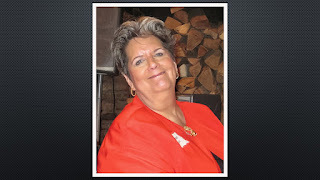
Susan Rice was a welcomer. And that’s important to remember. It’s easy for us to say “That's not how I do it” and dismiss folks. That’s not what mentors do, though.
Mentors create an atmosphere where people grow into members who want to be active. Mentors don’t insist that people do things. Mentors recognize the importance of the ground that has been laid before and help new people and their energy learn from that. We all stand on the shoulders of those who have come before us and a good mentor gives you a boost up there.
Curtis also pointed out that Susan Rice was full of intellectual curiosity and progressive thought. My favorite line from later in this announcement was about “the lifting up of the uncertain and awkward and the inclusion of all in everything we do.”
Everyone has been uncertain and awkward in their lives. It may be hard to believe, but even Peter Blau was the new kid on the block at one point.
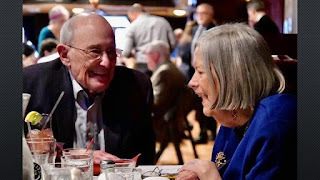
Susan Rice is a great guidepost for us as we move forward in this hobby. So be a Susan.
Be generous with your time and lift people up, no matter how uncertain or different. There’s a good chance we’ll learn something from them. But instead of just talking about how people have been great mentors, let’s take a minute to think about how WE can be mentors.
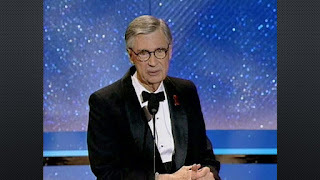
Even though he is not a known Sherlockian, someone I greatly admire is Fred Rogers.
When giving speeches, Mister Rogers would have his audience take a silent minute to think of people who had helped them become who they are. I’d like to flip that around and ask you to think of a newer Sherlockian that does things a little differently than you. Give that person just 30 seconds of your time and thought right now and ask yourself, how can I be a mentor? I’ll keep the time.
:30 Seconds
Thank you for that.
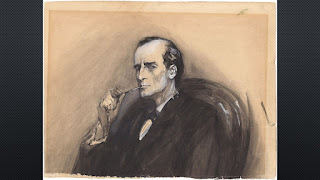
As we think of the future it’s important to remember that it all starts from today. And our actions and beliefs now will influence the future of Sherlockiana. We can look to the future by learning from the past and the present.
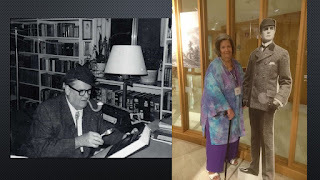
Plant the seeds of Sherlockiana like a teacher does.
Recruit new folks like John Bennett Shaw did.
Build a community like 221B Con and your local scions do.
And welcome new energy while sharing yours like Susan Rice did.
Like the interview answers I shared at the beginning of this talk said, Sherlockiana is always moving forward. We are a living, breathing, organism that continues to welcome new members year after year. And if we keep our ears attuned to catch not only the distant, but also the new version of that view halloo, the game will always be afoot.
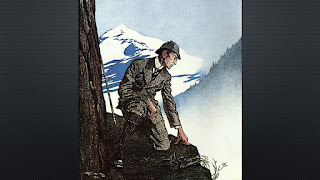
May 28, 2023
Interesting Interview: Bonnie MacBird
If we were to judge one another in this hobby on our output, you can bet that Bonnie MacBird would be getting some very high marks. Since 2016, she has put out five Sherlock Holmes novels, and we aren't talking about short stories here! You definitely get your money's worth with books from Bonnie MacBird. But Bonnie's creative output doesn't end with her novels. She is also an actor, playwright, producer, and screenwriter. See? I told you she was prolific!
But Bonnie is also a wonderful person and Sherlockian. Her energy and love for this hobby is contagious and she is known around the globe. Originally from California and now residing in London, you never know where she'll show up. Whether it's an event in London, book signing in New York, or random Zoom meeting, you know right away that you are in the presence of an extremely intelligent woman and passionate Sherlockian!
How do you define the word“Sherlockian”?
It’s all about the internal world weshare. On the silly end, it’s the shareddelight with other Sherlockians finding seventeen steps up to something, or ahotel room numbered 221, or a dog named Toby. And in our strange new world of splintered attention,anti-intellectualism, and triggered everything, it’s finding that fellow Sherlockian as a welcome port in astorm, that person whose shared passion for Holmes means that they alsotreasure intelligence, scientific reasoning, friendship, humour and a passionfor a tale well told. Sherlockians findpoints of connection both trivial and cosmic, silly and profound, and have fundoing so. And they are all readers.
How did you become a Sherlockian?
I read the canon at age ten, beganwatching the black and white movies on TV and basically inhaled the characterand he has never left me. As for joiningin the greater organization, that was all Les Klinger’s doing. He said I “must come to the BSI weekend” andthat I’d make my best friends among Sherlockians. I hesitated, shy, he insisted; he was right.
What is your profession and does that affect how you enjoy being a Sherlockian?
For the last eleven years I have focused on writing traditional Sherlock Holmes novels in the style of the originals for HarperCollins. But before that, I spent thirty years in the entertainment business as a studio exec, a story editor of feature films, a screenwriter (TRON) a producer (three local Emmys) and an actor. I’m all about story. I recognize Conan Doyle as a master storyteller, and Holmes and Watson among the best fictional creations ever. During my time as a story editor I locked into good structure and pacing, and a sense of audience. Who is watching? Who is reading? How can we give them the very best ride… and while doing so, add something of beauty or value to the world. As an actor I went further into the heart of character, finding in every exchange of dialogue the subtext, the turns, the clues to previous life, mood, intent.
What is your favorite canonical story?
Three of them: "The Second Stain." "The Naval Treaty." "Scandal in Bohemia."
Who is a specific Sherlockian that you think others would find interesting?
Peggy MacFarlane. If Peggy has already been featured, thenPeter Cannon, recently retired editor at Publisher’s Weekly.
What subset of Sherlockiana really interests you?
I’m particularly fascinated with theworld of the late nineteenth century. Itwas, like the late twentieth century, a time when change itself changed. In medicine, for example, the germ theoryfinally gained traction, anesthesia was developed, it was the birth ofpsychiatry. Technology such as the steamengine, industrialization, trains, telegraphs, and newspapers and latertelephones shrank distance between people, and suddenly everyone shared thesame news… instantly. Socially there wasunrest, unionization, terrorists, the rise of the women’s movement, the growthof social organisations attempting to help the disadvantaged. The policing system changed. In our own time…starting in the 1960’s, thecomputer revolution, political protests, civil rights, space travel, andadvancements in science and medicine marked the late twentieth century as asimilar time of rapid and deeply influential change. Both eras featured a kind of optimism, mixedwith a rawness, an electricity, a bloom of invention, technology, imaginationand growth – all amidst turmoil. Twowildly transformational eras and exciting times to be alive.
In "His Final Bow," Holmes foresees adark time, but with light following. I believe we are facing a similar time rightnow, just a little over a hundred years later. The bittersweet moments ofHolmes’ final case gave into what we now call WWI, followed by a frenetic butbrief “roaring” twenties, then the Depression and WWII. A great many dark years. But that vital humanspirit emerged later for another intense phase of invention and growth and artin the fifties, sixties and going forward to the end of the last century. Thisvibrancy and optimism coupled with turmoil have a lot in common with Holmes’stime.
I believe we are once again standing onthe precipice of a dark time. Like Holmes, I believe our beacon of light mustcome through education. Our heroes onthe page will provide us comfort, if only in books, for now. Perhaps they’ll provide lessons that the nextgeneration of heroes can use. Literacy is key.
Your pastiches are tours deforce! What is your writing process?
As Holmes would say, my blushes! Thankyou! I write every day. Seven days a week. The very famous “butt on chair”technique. My current process is to write to word count,not to time. Sometimes my wordcount goaltakes me an hour, sometimes six. I’ve justwritten through three very challenging years, locked down, 6,000 miles from friends and pets, isolatedand unable to leave a flat where our neighbors decided to undergo noisy constructionfor a solid two years of this. Meanwhilemy beloved husband developed stage four cancer. Using my relentless, butt-on-chair-no-matter-what I finished two novelsdespite this. Or maybe they saved me, Idon’t know. I might have gone madwithout the work.
About my process, I start with a title,the major crime, villain and the reason they did it. I then write a theme around this. I then pick a year and season. And imagine an action scene that features allof the above. Then I just start writing. I’m a pantser, after I’ve figured out the above. I don’t know how Holmesis going to figure it out when I start. But he leads me there. Researchis key to my process and I use libraries, the internet, museums and when thereis no pandemic to stop me, I quite literally location scout. For example, the ice house scene in Unquiet Spirits and the near drowning on the Thames foreshore in The Devil's Due camedirectly from on-site visits to those very places.
I put a lot of this research intoannotations viewable on my website. www.macbird.com
As a Sherlockian/Holmesian who has hadthe opportunity to live in both America and England, what are somedifferences you notice between how we celebrate Holmes?
In both places, people of all walks oflife and all professions are Sherlockians, and share intelligence, arcane sideinterests, an interest in Victorian culture and inventions… and almost always adelightful sense of humour. I suppose in Britain there is a certain sense ofownership, a “Holmes is one of us” and a real pride in the literary traditionthat Conan Doyle came from … as well as the writers his work spawned. Americans are equally literary, but morelikely to be collectors of “stuff” than are the Brits. Americans are less hesitant to show off acquisitions andaccomplishments, whereas the Brits are a little more understated and you needto unpeel the reserve a little more slowly. They surprise you. Both areaccomplished men and women and both share deep enthusiasm and a certainsilliness which is a delight.
What book would you recommend to other Sherlockians?
Well, if you want the definitive copyof the canon, of course Les Klinger’s volumes can’t be beat. I love the Sherlock Holmes Miscellany byRoger Johnson and Jean Upton. If youmight consider pastiche and haven’t read my series, I would hope youmight give them a try. There are five to date and the last was illustrated byFrank Cho. The Doyle biographies byDaniel Stashower and Alistair Duncan are excellent.
If youjust want a brilliant non-Sherlockian piece of period fiction (set a littlelater but redolent of Fin de Siècle malaise and wicked humor) then read AGentleman in Moscow by Amor Towles. Ifyou want an antidote to depression read Discipline is Destiny by Ryan Holidaywhich is not a the “fix me” book that it sounds, but a comfort read, particularlyin these times. I have endless morerecommendations.
Where do you see Sherlockiana in 5 or 10 years from now?
There will likely be some new goodfilm, television and theatre to delight us and incite comparisons, gossip and manypanels where earnest Sherlockians will attack and defend the latest portrayals. I hope to keep writing my pastiches aslong as I can and I hope Sherlockians will still seek them out. Maybe a welcome wash of sanity will blanketthe earth, and everyone will become a Sherlockian. Ha! If only. But I remain hopeful for a new screen incarnation of Holmes - thirty-something, brilliant, hawklike, withsad eyes, tousled hair, and a disarmingsmile -- and a handsome, brave Watson alongside .That’s how I see them as Iwrite…
Interesting Interview: Bonnie Macbird
If we were to judge one another in this hobby on our output, you can bet that Bonnie Macbird would be getting some very high marks. Since 2016, she has put out five Sherlock Holmes novels, and we aren't talking about short stories here! You definitely get your money's worth with books from Bonnie Macbird. But Bonnie's creative output doesn't end with her novels. She is also an actor, playwright, producer, and screenwriter. See? I told you she was prolific!
But Bonnie is also a wonderful person and Sherlockian. Her energy and love for this hobby is contagious and she is known around the globe. Originally from California and now residing in London, you never know where she'll show up. Whether it's an event in London, book signing in New York, or random Zoom meeting, you know right away that you are in the presence of an extremely intelligent woman and passionate Sherlockian!
How do you define the word���Sherlockian���?
It���s all about the internal world weshare. On the silly end, it���s the shareddelight with other Sherlockians finding seventeen steps up to something, or ahotel room numbered 221, or a dog named Toby. And in our strange new world of splintered attention,anti-intellectualism, and triggered everything, it���s finding that fellow Sherlockian as a welcome port in astorm, that person whose shared passion for Holmes means that they alsotreasure intelligence, scientific reasoning, friendship, humour and a passionfor a tale well told. Sherlockians findpoints of connection both trivial and cosmic, silly and profound, and have fundoing so. And they are all readers.
How did you become a Sherlockian?
I read the canon at age ten, beganwatching the black and white movies on TV and basically inhaled the characterand he has never left me. As for joiningin the greater organization, that was all Les Klinger���s doing. He said I ���must come to the BSI weekend��� andthat I���d make my best friends among Sherlockians. I hesitated, shy, he insisted; he was right.
What is your profession and does that affect how you enjoy being a Sherlockian?
For the last eleven years I have focused on writing traditional Sherlock Holmes novels in the style of the originals for HarperCollins. But before that, I spent thirty years in the entertainment business as a studio exec, a story editor of feature films, a screenwriter (TRON) a producer (three local Emmys) and an actor. I���m all about story. I recognize Conan Doyle as a master storyteller, and Holmes and Watson among the best fictional creations ever. During my time as a story editor I locked into good structure and pacing, and a sense of audience. Who is watching? Who is reading? How can we give them the very best ride��� and while doing so, add something of beauty or value to the world. As an actor I went further into the heart of character, finding in every exchange of dialogue the subtext, the turns, the clues to previous life, mood, intent.
What is your favorite canonical story?
Three of them: "The Second Stain." "The Naval Treaty." "Scandal in Bohemia."
Who is a specific Sherlockian that you think others would find interesting?
Peggy MacFarlane. If Peggy has already been featured, thenPeter Cannon, recently retired editor at Publisher���s Weekly.
What subset of Sherlockiana really interests you?
I���m particularly fascinated with theworld of the late nineteenth century. Itwas, like the late twentieth century, a time when change itself changed. In medicine, for example, the germ theoryfinally gained traction, anesthesia was developed, it was the birth ofpsychiatry. Technology such as the steamengine, industrialization, trains, telegraphs, and newspapers and latertelephones shrank distance between people, and suddenly everyone shared thesame news��� instantly. Socially there wasunrest, unionization, terrorists, the rise of the women���s movement, the growthof social organisations attempting to help the disadvantaged. The policing system changed. In our own time���starting in the 1960���s, thecomputer revolution, political protests, civil rights, space travel, andadvancements in science and medicine marked the late twentieth century as asimilar time of rapid and deeply influential change. Both eras featured a kind of optimism, mixedwith a rawness, an electricity, a bloom of invention, technology, imaginationand growth ��� all amidst turmoil. Twowildly transformational eras and exciting times to be alive.
In "His Final Bow," Holmes foresees adark time, but with light following. I believe we are facing a similar time rightnow, just a little over a hundred years later. The bittersweet moments ofHolmes��� final case gave into what we now call WWI, followed by a frenetic butbrief ���roaring��� twenties, then the Depression and WWII. A great many dark years. But that vital humanspirit emerged later for another intense phase of invention and growth and artin the fifties, sixties and going forward to the end of the last century. Thisvibrancy and optimism coupled with turmoil have a lot in common with Holmes���stime.
I believe we are once again standing onthe precipice of a dark time. Like Holmes, I believe our beacon of light mustcome through education. Our heroes onthe page will provide us comfort, if only in books, for now. Perhaps they���ll provide lessons that the nextgeneration of heroes can use. Literacy is key.
Your pastiches are tours deforce! What is your writing process?
As Holmes would say, my blushes! Thankyou! I write every day. Seven days a week. The very famous ���butt on chair���technique. My current process is to write to word count,not to time. Sometimes my wordcount goaltakes me an hour, sometimes six. I���ve justwritten through three very challenging years, locked down, 6,000 miles from friends and pets, isolatedand unable to leave a flat where our neighbors decided to undergo noisy constructionfor a solid two years of this. Meanwhilemy beloved husband developed stage four cancer. Using my relentless, butt-on-chair-no-matter-what I finished two novelsdespite this. Or maybe they saved me, Idon���t know. I might have gone madwithout the work.
About my process, I start with a title,the major crime, villain and the reason they did it. I then write a theme around this. I then pick a year and season. And imagine an action scene that features allof the above. Then I just start writing. I���m a pantser, after I���ve figured out the above. I don���t know how Holmesis going to figure it out when I start. But he leads me there. Researchis key to my process and I use libraries, the internet, museums and when thereis no pandemic to stop me, I quite literally location scout. For example, the ice house scene in Unquiet Spirits and the near drowning on the Thames foreshore in The Devil's Due camedirectly from on-site visits to those very places.
I put a lot of this research intoannotations viewable on my website. www.macbird.com
As a Sherlockian/Holmesian who has hadthe opportunity to live in both America and England, what are somedifferences you notice between how we celebrate Holmes?
In both places, people of all walks oflife and all professions are Sherlockians, and share intelligence, arcane sideinterests, an interest in Victorian culture and inventions��� and almost always adelightful sense of humour. I suppose in Britain there is a certain sense ofownership, a ���Holmes is one of us��� and a real pride in the literary traditionthat Conan Doyle came from ��� as well as the writers his work spawned. Americans are equally literary, but morelikely to be collectors of ���stuff��� than are the Brits. Americans are less hesitant to show off acquisitions andaccomplishments, whereas the Brits are a little more understated and you needto unpeel the reserve a little more slowly. They surprise you. Both areaccomplished men and women and both share deep enthusiasm and a certainsilliness which is a delight.
What book would you recommend to other Sherlockians?
Well, if you want the definitive copyof the canon, of course Les Klinger���s volumes can���t be beat. I love the Sherlock Holmes Miscellany byRoger Johnson and Jean Upton. If youmight consider pastiche and haven���t read my series, I would hope youmight give them a try. There are five to date and the last was illustrated byFrank Cho. The Doyle biographies byDaniel Stashower and Alistair Duncan are excellent.
If youjust want a brilliant non-Sherlockian piece of period fiction (set a littlelater but redolent of Fin de Si��cle malaise and wicked humor) then read AGentleman in Moscow by Amor Towles. Ifyou want an antidote to depression read Discipline is Destiny by Ryan Holidaywhich is not a the ���fix me��� book that it sounds, but a comfort read, particularlyin these times. I have endless morerecommendations.
Where do you see Sherlockiana in 5 or 10 years from now?
There will likely be some new goodfilm, television and theatre to delight us and incite comparisons, gossip and manypanels where earnest Sherlockians will attack and defend the latest portrayals. I hope to keep writing my pastiches aslong as I can and I hope Sherlockians will still seek them out. Maybe a welcome wash of sanity will blanketthe earth, and everyone will become a Sherlockian. Ha! If only. But I remain hopeful for a new screen incarnation of Holmes - thirty-something, brilliant, hawklike, withsad eyes, tousled hair, and a disarmingsmile -- and a handsome, brave Watson alongside .That���s how I see them as Iwrite���



